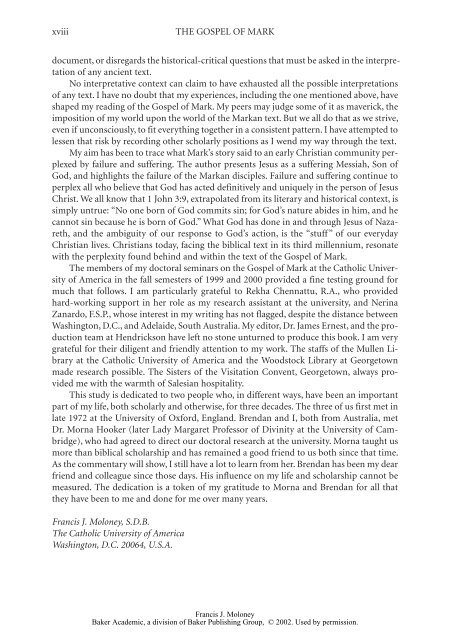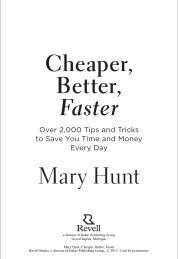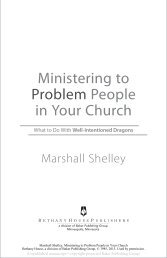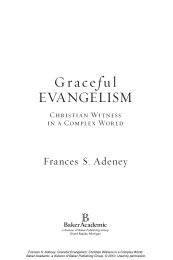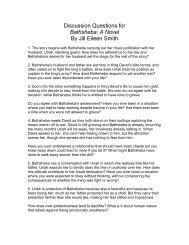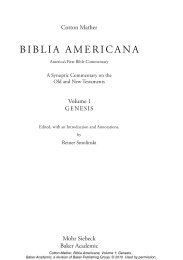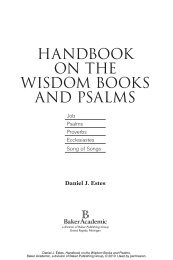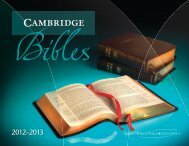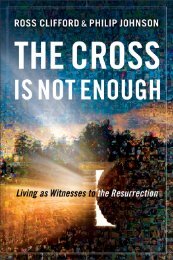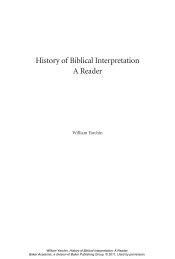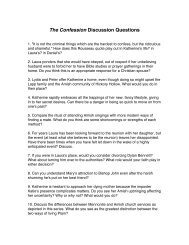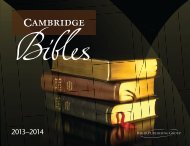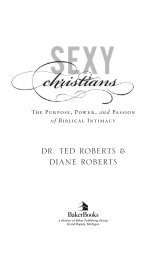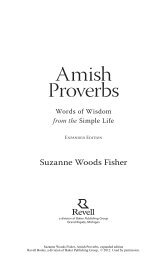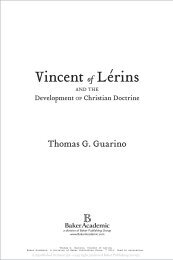the gospel of mark a commentary - Baker Publishing Group
the gospel of mark a commentary - Baker Publishing Group
the gospel of mark a commentary - Baker Publishing Group
Create successful ePaper yourself
Turn your PDF publications into a flip-book with our unique Google optimized e-Paper software.
xviii<br />
THE GOSPEL OF MARK<br />
document, or disregards <strong>the</strong> historical-critical questions that must be asked in <strong>the</strong> interpretation<br />
<strong>of</strong> any ancient text.<br />
No interpretative context can claim to have exhausted all <strong>the</strong> possible interpretations<br />
<strong>of</strong> any text. I have no doubt that my experiences, including <strong>the</strong> one mentioned above, have<br />
shapedmyreading<strong>of</strong><strong>the</strong>Gospel<strong>of</strong>Mark.Mypeersmayjudgesome<strong>of</strong>itasmaverick,<strong>the</strong><br />
imposition <strong>of</strong> my world upon <strong>the</strong> world <strong>of</strong> <strong>the</strong> Markan text. But we all do that as we strive,<br />
even if unconsciously, to fit everything toge<strong>the</strong>r in a consistent pattern. I have attempted to<br />
lessenthatriskbyrecordingo<strong>the</strong>rscholarlypositionsasIwendmywaythrough<strong>the</strong>text.<br />
My aim has been to trace what Mark’s story said to an early Christian community perplexed<br />
by failure and suffering. The author presents Jesus as a suffering Messiah, Son <strong>of</strong><br />
God, and highlights <strong>the</strong> failure <strong>of</strong> <strong>the</strong> Markan disciples. Failure and suffering continue to<br />
perplexallwhobelievethatGodhasacteddefinitivelyanduniquelyin<strong>the</strong>person<strong>of</strong>Jesus<br />
Christ. We all know that 1 John 3:9, extrapolated from its literary and historical context, is<br />
simply untrue: “No one born <strong>of</strong> God commits sin; for God’s nature abides in him, and he<br />
cannot sin because he is born <strong>of</strong> God.” What God has done in and through Jesus <strong>of</strong> Nazareth,<br />
and <strong>the</strong> ambiguity <strong>of</strong> our response to God’s action, is <strong>the</strong> “stuff” <strong>of</strong> our everyday<br />
Christian lives. Christians today, facing <strong>the</strong> biblical text in its third millennium, resonate<br />
with <strong>the</strong> perplexity found behind and within <strong>the</strong> text <strong>of</strong> <strong>the</strong> Gospel <strong>of</strong> Mark.<br />
The members <strong>of</strong> my doctoral seminars on <strong>the</strong> Gospel <strong>of</strong> Mark at <strong>the</strong> Catholic University<br />
<strong>of</strong> America in <strong>the</strong> fall semesters <strong>of</strong> 1999 and 2000 provided a fine testing ground for<br />
much that follows. I am particularly grateful to Rekha Chennattu, R.A., who provided<br />
hard-working support in her role as my research assistant at <strong>the</strong> university, and Nerina<br />
Zanardo, F.S.P., whose interest in my writing has not flagged, despite <strong>the</strong> distance between<br />
Washington,D.C.,andAdelaide,SouthAustralia.Myeditor,Dr.JamesErnest,and<strong>the</strong>production<br />
team at Hendrickson have left no stone unturned to produce this book. I am very<br />
grateful for <strong>the</strong>ir diligent and friendly attention to my work. The staffs <strong>of</strong> <strong>the</strong> Mullen Library<br />
at <strong>the</strong> Catholic University <strong>of</strong> America and <strong>the</strong> Woodstock Library at Georgetown<br />
made research possible. The Sisters <strong>of</strong> <strong>the</strong> Visitation Convent, Georgetown, always provided<br />
me with <strong>the</strong> warmth <strong>of</strong> Salesian hospitality.<br />
This study is dedicated to two people who, in different ways, have been an important<br />
part <strong>of</strong> my life, both scholarly and o<strong>the</strong>rwise, for three decades. The three <strong>of</strong> us first met in<br />
late 1972 at <strong>the</strong> University <strong>of</strong> Oxford, England. Brendan and I, both from Australia, met<br />
Dr. Morna Hooker (later Lady Margaret Pr<strong>of</strong>essor <strong>of</strong> Divinity at <strong>the</strong> University <strong>of</strong> Cambridge),<br />
who had agreed to direct our doctoral research at <strong>the</strong> university. Morna taught us<br />
more than biblical scholarship and has remained a good friend to us both since that time.<br />
As <strong>the</strong> <strong>commentary</strong> will show, I still have a lot to learn from her. Brendan has been my dear<br />
friend and colleague since those days. His influence on my life and scholarship cannot be<br />
measured. The dedication is a token <strong>of</strong> my gratitude to Morna and Brendan for all that<br />
<strong>the</strong>y have been to me and done for me over many years.<br />
FrancisJ.Moloney,S.D.B.<br />
The Catholic University <strong>of</strong> America<br />
Washington, D.C. 20064, U.S.A.<br />
Francis J. Moloney<br />
<strong>Baker</strong> Academic, a division <strong>of</strong> <strong>Baker</strong> <strong>Publishing</strong> <strong>Group</strong>, © 2002. Used by permission.


